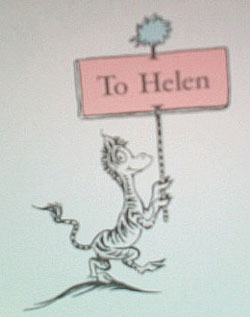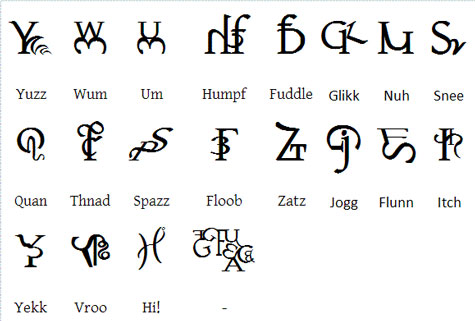
Dear Reader,
Please accept this post as an invitation to consider Dr. Theophrastus Seuss, who would have been 112 years of age today if were still with us. We remember him as the creator of silly stories and pictures—it’s easy to forget their intent as a reminder of the importance of thinking outside the box and the possibility that his work amounts to a handbook in that regard.
During the part of his career for which he is most known and celebrated, the good Doctor asked us to broaden our imagination and to always employ it. His mind was the sort that encouraged ours to see the world as—at least potentially—larger and more wondrous than we do in daily life.
It seems that most people believe Seuss to be only Theodor Geisel’s invented pen name. We don’t ever assume he was a real doctor—although his was a factual, honorary degree bestowed by Dartmouth, his alma mater, in 1956. It seems fairly likely that too many of us are falsely instructed that Mr. Geisel just made the name up. Seuss was, however, not only the author and illustrator’s middle name but also his mother’s maiden name.
Given the German heritage of the Geisel and Seuss families and the history of these families in America, there is a strong chance some of Theodor’s relatives were among those exiled from the German Confederation in 1848. In what would become Germany a quarter century later, the March Revolution was a social movement seeking greater freedom of assembly and of the press, among other rights and improvements. Given this in the family history, a possible origin of the somewhat liberal stance of Mr. Geisel and his desire to work in journalism seems clear.
In 1955, he published a somewhat peculiar alphabet book for children. On Beyond Zebra! continued after Z with 19 extra letters. Although far less celebrated than The Cat in the Hat or How the Grinch Stole Christmas, there may be a deeper story behind On Beyond Zebra!.
 During the writing, Dr. Seuss’s wife, Helen, was suffering from Guillain-Barre syndrome. The recovery required her to relearn almost everything, including walking and talking. Although I have not found direct proof that Dr. Seuss was using the early drafts of On Beyond Zebra! to help Helen with her recovery, it seems a likely possibility.
During the writing, Dr. Seuss’s wife, Helen, was suffering from Guillain-Barre syndrome. The recovery required her to relearn almost everything, including walking and talking. Although I have not found direct proof that Dr. Seuss was using the early drafts of On Beyond Zebra! to help Helen with her recovery, it seems a likely possibility.
Imagination, as Seuss encouraged, can take us to the unique combination of pathos and cooperation to this richer story.
Mrs. Geisel did recover and lived twelve more years. During this time, and before the illness, the couple—who’d met at Oxford—traveled to more than 30 nations. Publish and work in advertising, along with a number of close friends and patrons, enabled the Geisels to live reasonably well, even during the Great Depression. It was also at Oxford that Helen encouraged Theodor to pursue a career using his talents with art and word. His ambition had been to teach.
In a way, he still does.
As conflict in Europe was growing into a truly World War, Dr. Seuss turned his skill and reputation to support of national morale and participation with the Allies. He produced over 400 political cartoons for the now-defunct PM newspaper. When the United States did enter the war, Mr. Geisel joined the US Army as a captain and head of its Animation Department.
Oh, the Places You’ll Go! has more meaningful subtext, in potential if not intent, when you look at the real places Helen and Theodor had actually been. They believed travel was good for the mind and that flights of fancy might be just as beneficial as having one’s passport packed and ready. It should be noted that Helen Geisel created books of her own, and they should be celebrated as well.
The real life of Mr. Geisel was not perfect, and it was not devoid of some tragedy. He knew this about himself and of us. The prevailing message of his effort was, and remains, that we get beyond our imperfections and always try. We’re human, true. What we imagine ourselves to be and accomplish is what is more important—particularly in the end.
Perhaps he’d forgive writing a poem today in his style and in his honor. If so, yours might start with the following:
What is a hero?
A person with flaws
Doing the best
To live with good laws…
Imagine now that the 19 special letters from On Beyond Zebra! (shown below), which may have been a gift to his wife and remain a treasure to us, also served during WWII. Suppose that the Nazzim of Bazzim mentioned in the description of one of these symbols was the codename for someone in the Middle East or in India. The Seuss technique may here be hiding a nazim (ناظم) or arranger of a “bazaar” providing necessary materiel for the war effort.
Another letter’s story tells us of a Miss Fuddle-Dee-Duddle who has assistants keeping her tail out of “muddle dee puddles.” Could she have been a member of a covert team ferrying supplies across the Atlantic to England or the French Resistance?
There’s a 20th letter at the close the book that is a bit of an exception to the preceding pages. It is meant to be inspired by and within the fiction as a case-in-point about the use of the advice—code or not.

Just as this post is an invitation, On Beyond Zebra! does the same job. Make up your own letters, especially this week.
The new letters of Dr. Seuss as special agents is, of course, just whimsical speculation. But the body of work from Mr. Geisel continues to encourage us to entertain ourselves with our own thinking and, while doing so, keep our minds sharp and our perspective keen.
Permit the final thought that, while not from Seuss himself, is certainly a Seussian question. Is zero an even numeral because it sits between two odd numbers? Could that be the key to the code—if there is one?
Thom Truelove is the co-founder of Psych Wing (a group developing short films set primarily in the sci fi genre) and a collaborating partner on future sci fi/fantasy novels with gothic Victorian fantasy author Leanna Renee Hieber (Tor Books).
As an essayist, his work has been picked up by such anthologies as the forthcoming “The Book of Starry Wisdom: Apocrypha of Lovecraft's Cthulhu” (edited and produced by Simon Berman). You are invited to visit Thom's blog, “Surfing the Zeitgeist” at thomtruelove.com.
